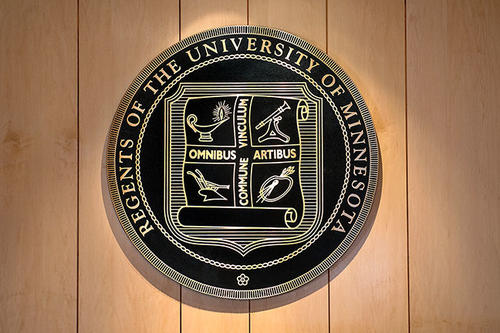
As the University of Minnesota continues its response to the COVID-19 pandemic, discussions about its financial position and anticipated challenges in the coming year were the focus of several conversations throughout two days of Board of Regents meetings this week. University President Joan Gabel introduced her systemwide operating budget proposal for the upcoming fiscal year (FY21) during Thursday’s Finance and Operations Committee.
“This unique time in our history means we face challenges—and opportunities—unlike any our University has previously encountered. Overcoming challenges and maximizing opportunities will require well-conceived and well-executed planning, starting with a budget that sets the University on a healthy path,” said Board Chair Ken Powell. “The Board has a tremendous responsibility to ensure that the University continues to operate on strong financial footing in spite of the pandemic. We’re committed to working closely with President Gabel and her administration to manage the COVID-19 response and emerge stronger in support of the University’s mission and all Minnesotans.”
Significant uncertainty about the upcoming year continues to create challenges for all organizations around the world. The University is no exception, which was reflected in Thursday’s budget presentation. Gabel reiterated that the current budgeting process and resulting recommendations are unique, as myriad factors beyond the University’s control will continue to affect the budget in the months ahead.
“All of our lives have been disrupted by the pandemic in challenging and painful ways. It has changed how we teach, learn, work and live, forcing all of us to become more comfortable with uncertainty and the need to consider many potential scenarios to address seemingly endless unpredictability,” said Gabel. “By necessity, our plans for the next year must be agile, allowing for adjustments to our course as circumstances change. Our budget recommendations were developed through robust consultation to provide a fully balanced and equitable plan with multiple contingency options. This will allow us to adapt in ways that best serve our students, faculty, staff and state, regardless of what challenges arise in the year ahead.”
Gabel presented for the Board’s consideration a COVID-19 Adjusted Budget. This budget is predicated on a return to regular operations in time for the fall semester (with social distancing and other precautionary guidance), a slight decrease in total enrollment for some colleges/campuses within the University system, and University housing and dining facilities operating with reduced occupancy compared to recent years.
The budget proposal also assumes already discussed cost-cutting actions related to employee compensation and a one-year tuition freeze for most University students systemwide. It recommends approval for only a limited number of high-priority investments, that units spend down any positive balances as a bridge to future revenue recovery and growth, and that reallocations and budget reductions will be required across all University units.
This recommended budget serves as the base from which contingency plans will be developed. Frameworks for two contingency plans were outlined for the Board. These plans would address challenges arising from continued reduced operations into or throughout the fall semester. The first of these scenarios, in which the University returns to regular operations at some point during the fall semester, estimates up to $124.5 million of additional financial impact beyond the COVID-19 Adjusted Budget. Should the University be unable to return to regular operations in the fall semester, the estimated financial impact would be an additional $146.5 million. Implementation of either plan would be subject to a future Board approval.
The Board also:
- Discussed a draft systemwide strategic plan and provided additional guidance to Gabel and University administrators on advancing the plan in the first of two scheduled Board conversations on the topic.
- Reviewed the recommended annual capital improvement budget for FY21, which is expected to come before the Board for action in June.
- Approved recommendations for faculty promotion, tenure and annual continuous appointments after reviewing those appointments with Executive Vice President and Provost Rachel Croson.
- Recognized award and scholarship recipients from throughout the University system, acknowledging more than 80 outstanding students, faculty members and staff.
- Confirmed three Board-appointed representatives to the East Gateway Project Committee: Tom Holtz, executive vice president at CBRE; Russ Nelson, the retired co-founder of NTH, and; Morris Sherman, a retired attorney formerly of Leonard Street and Deinard (now Stinson).
- Discussed the University’s extraordinary contributions to Minnesota as researchers, innovators and educators during the COVID-19 pandemic.
- Heard updates about the projected academic and enrollment impacts of COVID-19 heading into the fall semester from Croson and Vice President for Research Chris Cramer.
- Received a report from Gopher Athletics Director Mark Coyle regarding how the COVID-19 pandemic has affected Gopher Athletics and what his department is anticipating in the year ahead.
- Received a report from Dr. Jakub Tolar, dean of the medical school and vice president for clinical affairs, who presented about the challenges facing the University’s Medical School and academic health enterprise in light of the COVID-19 pandemic.
The Board of Regents will meet next on June 11-12, 2020. Visit regents.umn.edu for more information.
- Categories:
- Campus Affairs





